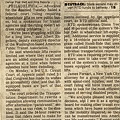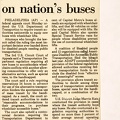[Headline] Disabled score transit win
[Subheading] Court: Buses must have wheelchair lifts
BY The Associated Press
The Standard Times 2-14-89 New Bedford, Mass
PHILADELPHIA — A U.S. appeals court ruling requiring wheelchair lifts on new public buses nationwide is the most important victory yet for disabled Americans seeking access to mass transit. plaintiffs’ lawyers say.
In its 2-1 ruling Monday, the 3rd U.S. Circuit Court of Appeals is also upheld a lower court order that the federal Department of Transportation eliminate a 3 percent cap on the amount of money transit authorities must spend to improve transportation for the disabled.
“The impact of the majority’s decision will be very substantial throughout the country and will interfere with the local decision-making authority," Judge Morton I. Greenberg wrote in his dissent. “I feel the court is overreaching."
The majority opinion by Judge Carol Lois Mansmann said a Transportation Department regulation requiring all new buses to accommodate wheelchairs conflicts with a regulation allowing communities to offer only an alternative service to the disabled.
The court noted that a 24-hour reservation needed for the alternative service hinders spontaneous use of mass transit, and ordered transit authorities to make "reasonable accommodations to their programs. i.e. purchase wheelchair-accessible buses."
The cost of improving transit services for the disabled would depend on each system, Timothy Cook, who represented the plaintiffs, has said. It costs $15,000 to equip a bus with a wheelchair lift and buses cost about $200,000, according to Joaquin Bowman. a spokesman for the Southeastern Pennsylvania Transportation Authority.
Judge Greenberg said the section concerning wheelchair lifts for new buses was not meant to apply to transit systems choosing alternative transportation for the disabled. He also said the 3 percent cap imposed in 1986 by the Reagan administration was not arbitrary.
A coalition called Americans Disabled for Accessible Public Transportation, which has chapters in 25 cities and whose members have been arrested at demonstrations around the country, filed the class-action lawsuit against the Transportation Department last year. Mr. Cook, who argued ADAPT’s case. called Monday's ruling "a major, major victory for the handicapped community. . . . We can't say enough positive things about it.” "We won on all points," added Stephen Gold. another ADAPT attorney.
Mr. Cook. director of the Washington-based National Disability Action Center, said he hoped the ruling would not he appealed in light of President Bush's comments about wanting to bring the disabled into the mainstream.
Transportation Department officials in Washington could not be reached for comment after office hours Monday.
ADAPT contended that a provision of the federal regulations allowed authorities receiving federal transportation funds to exclude the disabled from “effective and meaningful" access.
- Created on
- Friday 12 July 2013
- Posted on
- Wednesday 22 July 2015
- Tags
- 24 hour advanced reservation, 3% cap, 3rd US Circuit Court of Appeals, ADAPT, Cape Cod, DOT, Philadelphia, Steve Gold, Tim Cook, wheelchair accessible buses
- Albums
- Visits
- 2572
- Rating score
- no rate
- Rate this photo


0 comments